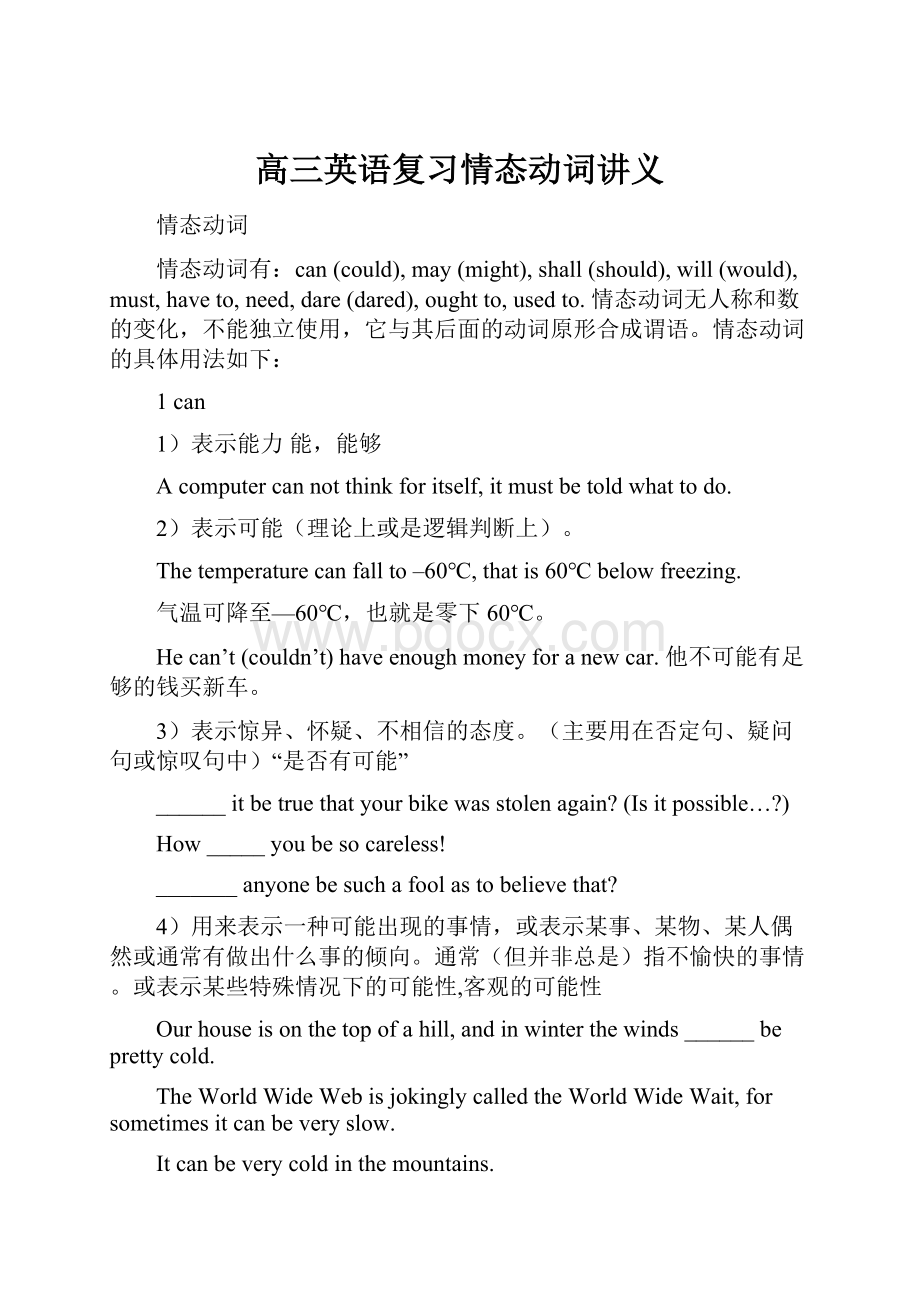高三英语复习情态动词讲义.docx
《高三英语复习情态动词讲义.docx》由会员分享,可在线阅读,更多相关《高三英语复习情态动词讲义.docx(36页珍藏版)》请在冰豆网上搜索。

高三英语复习情态动词讲义
情态动词
情态动词有:
can(could),may(might),shall(should),will(would),must,haveto,need,dare(dared),oughtto,usedto.情态动词无人称和数的变化,不能独立使用,它与其后面的动词原形合成谓语。
情态动词的具体用法如下:
1can
1)表示能力能,能够
Acomputercannotthinkforitself,itmustbetoldwhattodo.
2)表示可能(理论上或是逻辑判断上)。
Thetemperaturecanfallto–60℃,thatis60℃belowfreezing.
气温可降至—60℃,也就是零下60℃。
Hecan’t(couldn’t)haveenoughmoneyforanewcar.他不可能有足够的钱买新车。
3)表示惊异、怀疑、不相信的态度。
(主要用在否定句、疑问句或惊叹句中)“是否有可能”
______itbetruethatyourbikewasstolenagain?
(Isitpossible…?
)
How_____youbesocareless!
_______anyonebesuchafoolastobelievethat?
4)用来表示一种可能出现的事情,或表示某事、某物、某人偶然或通常有做出什么事的倾向。
通常(但并非总是)指不愉快的事情。
或表示某些特殊情况下的可能性,客观的可能性
Ourhouseisonthetopofahill,andinwinterthewinds______beprettycold.
TheWorldWideWebisjokinglycalledtheWorldWideWait,forsometimesitcanbeveryslow.
Itcanbeverycoldinthemountains.
Accidentscanhappenonsuchrainydays.
Iwouldrathergoshoppingalonethangowithherbecauseshecanberathertiresomeattimes.
比较:
Drivingontheseroads_____beaverynerve-rackingbusiness.
Drivingonthisicyroad_____bedangeroustoday.
5)比较委婉客气地提出问题或陈述看法。
Can(Could)youlendmeahand?
帮我一把好吗?
I’mafraidwecouldn’tgiveyouananswertoday.恐怕我们今天不能给你答复。
6)can表示能力时,还可用beableto代替。
如:
Icould/wasabletoplaychesswhenIwassix.
但beableto可用于各种时态
I'llnotbeabletocomethisafternoon.
Ihavebeenabletodothework.
Ihopetobeabletodothework.
区别:
Somethingwaswrongwithmycar,butI________driveittothegarage.
=Somethingwaswrongwithmycar,butI________driveittothegarage.
=Somethingwaswrongwithmycar,butI________driveittothegarage.
beableto可以表示经过努力或克服了困难之后做成了某事,相当于managetodo,succeedindoing
7)表推测can’thavedone表示对过去发生的事情的否定推测
Shecan’tbeathomenow,forthelightsareallout.
Itcan’thaverainedlastnight,forthegroundisdry.
8)can的习惯用法
Itisasgoodascanbe.
不能再好了。
Onecannotbetoocarefultodriveacar./indrivingacar.
Onecannotbutbemovedbyhisnobledeeds.
人们不能不为他那高尚的行为所感动。
can’t/couldn’thelpdoing
can’t/couldn’thelptodo
2.could
1)can的过去式
IcouldspeakalittleJapanesewhenIwasatcollegebutnowIhaveforgottenallofthemexceptafewwords.
2)客气的请求
CouldIborrowyourdictionary?
Yes/Ofcourse,youcan.
3)could用在肯定句中表示一种比较婉转的怀疑。
Hisstory_______betrue,butIhardlythinkitis.
4)couldhavedone表示对过去能做而未做的事感到惋惜、遗憾。
意思是“本可以;可能已经做了某事”
—IstayedatahotelwhileinNewYork.
__Oh,didyou?
YoucouldhavestayedwithBarbara.
5)couldn'thavedone”表示对过去情况的推测,意思是“不可能做了”。
例如:
Hecouldnothaveseenthefilmbecauseheknewnothingaboutit.
3.may,might
1)表示许可,might可以指过去时间,也可指现在时间,语气更委婉。
Youmaytakewhateveryoulike.你喜欢什么就拿什么。
May(Might)Iaskforaphotoofyourbaby?
我可以要一张你宝宝的照片吗?
-MayIuseyourcar?
-No,youmustn’t.(Sorry,butI’musingitnow./You’dbetternot.)
在回答以may引起的问句时,多避免用这个词,而用其它方式,如Yes,please./Certainly.
/Pleasedon’t./You’dbetternot./No,youmustn’t.等,以免显得太严峻或不客气。
2)表示可能(可能性较must和can小)。
might可以指过去时间,也可以指现在时间,但语气更加不肯定。
Petermaycomewithustonight,butheisn'tverysureyet.
Theymightbehavingameeting,butI’mnotsure.他们有可能在开会,不过我不肯定。
3)may/mighthavedone表示对过去的推测。
It’stoolate.Hemayhavegonetobed.
Yesterday,Janewalkedawayfromthediscussion.Otherwise,shemighthavesaidsomethingshewouldregretlater.
4.shall
1)表征询意见,用于第一、第三人称疑问句。
ShallIgetyousometea?
我给你点茶好吗?
2)表说话人的意愿,有“命令、允诺、警告、威胁”等意思,用于第二、第三人称陈述句。
YoushalldoasIsay.按我说的做。
(命令)
Youshallhavemyanswertomorrow.你明天可以得到我的答复。
(允诺)
Youshallfailifyoudon'tworkhard.(警告)
3)当宣布法律、规定时
Ithasbeenannouncedthatcandidatesshallremainintheirseatsuntilallthepapershavebeencollected.(规则或规定)
5.should
1)表义务。
意为“应该”(某件事宜于做),用于各种人称。
Youshouldbepolitetoyourteachers.你对老师应该有礼貌。
Youshouldn’twasteanytime.你不应该浪费时间。
2)表推测,意为“想必一定、照说应该、估计”等。
Thefilmshouldbeverygoodasitisstarringfirst-classactors.
这部新电影是一流演员主演的,估计拍得很好。
Theyshouldbehomebynow.照说他们现在应当已经到家了。
--WhencanIcomeforthephotos?
Ineedthemtomorrowafternoon.
--Theyshouldbereadyby12:
00.
3).在名词性从句中表感情,即说话人认为应该如此。
例如:
Itisnaturalthatstudentsshouldstudyhard.
4).表示“竟然”
Swineflueshouldhavenothingtodowithpigs.
5).shouldhavedone表示过去应该做而未做某事。
含有惋惜、责备的意味。
例如:
Weshouldhavestudiedlastnight,butwewenttotheconcertinstead.
6.will
1)表意愿,用于各种人称陈述句。
Noneissoblindasthosewhowon’tsee.不愿看的人眼最瞎。
Ifyouwillreadthebook,I’lllendittoyou.如果你愿意读这本书,我会把它借给你。
2)表示询问对方的意愿或向对方提出请求,用于第二人称的疑问句中
Willyouclosethewindow?
It’sabitcold.请你把窗户关上好吗?
有点冷。
Won’tyoudrinksomemorecoffee?
再来一点咖啡好吗?
3)表示某种倾向或习惯性动作。
Fishwilldieoutofwater.鱼离开水就不能活。
Theboywillsittherehourafterhourlookingatthetrafficgoby.
那男孩常常坐在那里好几个钟点,看着车辆行人通过。
4)表功能
Thedoor/windowwon’topen.
7.would
1)表意愿。
Theywouldnotlethiminbecausehewaspoorlydressed.他们不让他进去因为他衣着破旧。
2)表委婉地提出请求、建议或看法,比will客气。
Wouldyoulikeanotherglassofbeer?
再来杯啤酒好吗?
Theywouldn’thaveanythingagainstit.他们不会有什么反对意见。
3)表过去反复发生的动作或过去的一种倾向。
Everytimeshewasintrouble,shewouldgotohimforhelp.
她每遇到麻烦都会向她求助。
他告诉我盒子打不开了。
WheneverIpassedhishouseIwouldseehimstandingunderthebigtree.
8.must
1)表示义务或强烈的劝告,意为“必须”,否定式表示“禁止”、“不准”。
在回答must的问句时,否定回答用needn't或don'thaveto.。
Wemustdoeverythingstepbystep.我们一切都必须循序渐进地做。
--Mustwehandinourexercise—booksnow?
我们现在就要交练习本吗?
--No,youneedn’t./No,youdon’thaveto.不必。
2)表示对现在情况的推测用“must+动词原形”。
意为“想必、准是、一定”等,只用于肯定句。
Hemustbeill.Helookssopale.他准是病了。
他的脸色苍白。
She’swearingadiamondnecklace.Shemusthavealotofmoney.
她戴着钻石项链,一定很有钱。
3)对过去情况的猜测用“must+have+过去分词”。
例如:
Itmusthaverainedlastnight,forthegroundiswet.
4)表示“偏要、硬要”做某事
-Howoldareyou,Madam?
-Ifyoumustknow,I’mtwicemyson’sage.
9.oughtto
1)表义务,意为“应该”(因责任、义务等该做),口气比should稍重。
Youarehisfather.Yououghttotakecareofhim.你是他父亲,应当管他。
Yououghtn’ttosmokesomuch.你不应该抽这么多烟。
2)表推测,暗含很大的可能,语气较弱。
HanMeioughttoknowhistelephonenumber.韩梅该知道他的电话号码。
There’safinesunset;itoughttobeafinedaytomorrow.今天有晚霞,明天应该是个好天。
3)oughttohavedone表示过去应该做而未做的事情。
例如:
Yououghttohavehelpedhim.(butyoudidn't)
1、can,和beableto
can和beableto在表示“能力”时意思相同,但在用法上有区别。
1).can表示主观能力,beableto表示客观能力。
can表示有这种能力或机会,beableto则表示经历一番艰难后能够做成某事。
例如:
Icandrive,butI'mnotabletodrivenowbecauseI'mdrunk.
Thefirespreadthroughthehotelveryquicklybuteveryonewasabletogetout.
2).can只有两种时态形式,现在式can和过去式could,而beableto有多种时态形式。
Marycanplaythepiano.Shehasbeenabletoplayitsinceshewas5.
3).beableto可用于动词不定式和动名词结构中,can不能。
例如:
Iregretnotbeingabletotakehisadvice.
2.must和haveto
must表示主观意志,而haveto表示由于客观因素不得不做某事。
Itoldherthatshemustgiveupsmoking.我叫她必须戒烟。
Wehadtogeteverythingreadythatnight.我们那晚得把一切准备就绪。
It’sgettingdark.Ihavetobeoffnow.
3.need和dare
need和dare既可用作情态动词,也可用作实义动词。
用作情态动词时,主要用于否定句和疑问句。
用作实义动词时,可用于各种句式。
1)用作情态动词needdo/needn’tdodaredo/darenotdodare有过去式dared
Youneedn’ttelephonehimnow.你现在不必打电话给他。
Idon’tthinkyouneedworry.我想你不必发愁。
Shedarenotgooutaloneatnight.她晚上不敢一个人出去。
HowdareyousayI’munfair?
你竟敢说我不公平?
Iwonderhowhedaredsaythattotheteacher.
2)用作实义动词needtodo/don’t(doesn’t/didn’t)needtodo
daretodo/don’t(doesn’t/didn’t)dare(to)do
Youdon’tneedtodoityourself.你不必亲自做这件事。
Weneedtotellthemthenews.我们需要把这消息告诉他们。
Weshoulddaretogiveourownopinion.我们要敢于提出自己的观点。
Hedidnotdare(to)lookup.他不敢抬头看。
3)need构成一般疑问句时,其肯定回答用must,否定回答用needn't。
-NeedIdoitnow?
-Yes,youmust.(No,youneedn't.)
4)need(not)havedone表示“本有(无)必要做某事,然而做了(没有做)”。
Youneedn'thavetoldhimaboutthenews.Hehadknownitlongbefore.
4.would和usedto
1)usedto表示过去与现在或过去某时与后来的情况有不同,而would只表过去的情况。
Peopleusedtothinkthattheearthwasflat.
过去人们认为地球是平的。
(现在人们不这么认为。
)
Shewouldgooutforawalkinthemorningwhenshewasinthecountry.
在乡下时,她总是在早晨去散会儿步。
(可能现在仍有散步的习惯。
)
2)usedto可表示过去的习惯动作和经常的情况,而would只表示过去的习惯动作。
Heusedto∕wouldsmokewhilewriting.过去他写东西时常抽烟。
Sheusedtobefat.她过去很胖。
1.I__________you,becauseIthoughtImustbewrong.
A.darenotaskB.darenottoaskC.darenotaskingD.daretonotask
2.There__________someflowersinthegarden.
A.wereusedtobeB.usedtobeC.usestobeD.usedtobehaving
3."__________Itakeitout?
""I'msorry,you__________."
A.Could...couldn'tB.Might...mightnotC.Could...canD.May...can't
4.Youwerestupidtoclimbthetree.You__________hurtyourself.
A.mayB.mightC.willD.mighthave
5.You__________thoseletters.Whydidn'tyou?
A.shouldpostB.shouldhavepostedC.musthavepostedD.oughttopost.
6.Allthelightsareon,theSmiths__________up.
A.mustgetB.isgettingC.mustbegettingD.wouldget
7.He__________leadahorsetothewaterbuthe__________notmakeitdrink.
A.will...canB.may...canC.may...daresD.dare...can
8."Needwedothisjobnow?
""Yes,__________."
A.youneedB.youshouldC.youmustD.youcan
9.__________tohavelunchwithustoday?
A.DoyoulikesB.WouldyoulikeC.WillyoulikedD.Haveyouliked
10.Hesaidthatyou__________watchTValltheeveningifyouwished.
A.mayB.mustC.canD.might
11.-IsJohncomingbytrain?
--Heshould,buthe__________not.Helikesdrivinghiscar.
A.mustB.canC.needD.may
12.Peter__________comewithustonight,butheisn'tverysureyet.
A.mustB.canC.mayD.will
13.Michael__________beapoliceman,forhe'smuchtooshort.
A.needn'tB.can'tC.shouldn'tD.won't
14.Ithoughtyou__________behungry,soIh